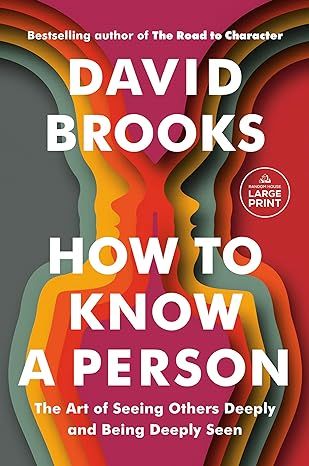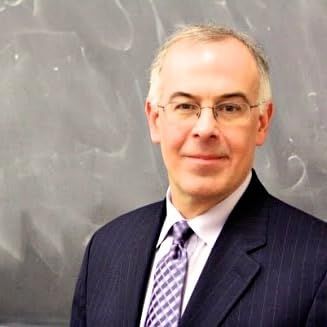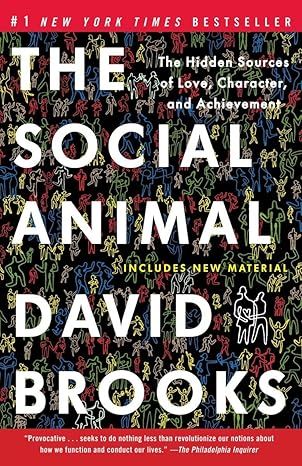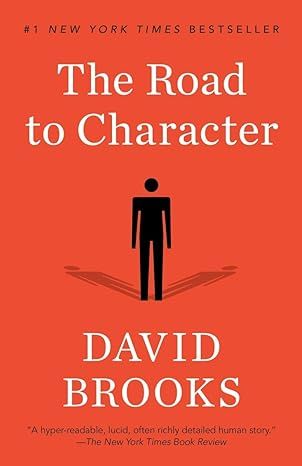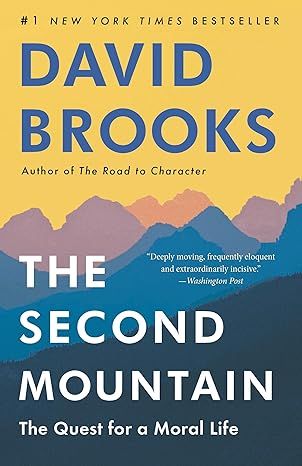How to Know a Person: The Art of Seeing Others Deeply and Being Deeply Seen (Random House Large Print)Paperback
4.6
-
3,831 ratings
NEW YORK TIMES BESTSELLER • A practical, heartfelt guide to the art of truly knowing another person in order to foster deeper connections at home, at work, and throughout our lives—from the author of The Road to Character and The Second Mountain
“More than a guide to better conversations, it’s a blueprint for a more connected and humane way of living. It’s a must-read for anyone looking to deepen their relationships and broaden their perspectives.”—Bill Gates, GatesNotes (Summer Reading Pick)
As David Brooks observes, “There is one skill that lies at the heart of any healthy person, family, school, community organization, or society: the ability to see someone else deeply and make them feel seen—to accurately know another person, to let them feel valued, heard, and understood.”
And yet we humans don’t do this well. All around us are people who feel invisible, unseen, misunderstood. In How to Know a Person, Brooks sets out to help us do better, posing questions that are essential for all of us: If you want to know a person, what kind of attention should you cast on them? What kind of conversations should you have? What parts of a person’s story should you pay attention to?
Driven by his trademark sense of curiosity and his determination to grow as a person, Brooks draws from the fields of psychology and neuroscience and from the worlds of theater, philosophy, history, and education to present a welcoming, hopeful, integrated approach to human connection. How to Know a Person helps readers become more understanding and considerate toward others, and to find the joy that comes from being seen. Along the way it offers a possible remedy for a society that is riven by fragmentation, hostility, and misperception.
The act of seeing another person, Brooks argues, is profoundly creative: How can we look somebody in the eye and see something large in them, and in turn, see something larger in ourselves? How to Know a Person is for anyone searching for connection, and yearning to be understood.
Read more
Kindle
$14.99
Available instantly
Audiobook
$0.99
with membership trial
Hardcover
$15.37
Paperback
$20.49
Ships from
Amazon.com
Payment
Secure transaction
ISBN-10
059379365X
ISBN-13
978-0593793657
Print length
432 pages
Language
English
Publisher
Random House Large Print
Publication date
November 27, 2023
Dimensions
6.07 x 1.15 x 9.18 inches
Item weight
1.05 pounds
Popular Highlights in this book
People don’t see the world with their eyes; they see it with their entire life.
Highlighted by 666 Kindle readers
Wise people don’t just possess information; they possess a compassionate understanding of other people. They know about life.
Highlighted by 602 Kindle readers
Product details
ASIN :
B0BV65SS5X
File size :
3223 KB
Text-to-speech :
Enabled
Screen reader :
Supported
Enhanced typesetting :
Enabled
X-Ray :
Enabled
Word wise :
Enabled
Editorial Reviews
Review
Praise for the works of David Brooks
The Second Mountain
“Deeply moving, frequently eloquent and extraordinarily incisive.”—The Washington Post
The Road to Character
“David Brooks’s gift—as he might put it in his swift, engaging way—is for making obscure but potent social studies research accessible and even startling.”—The New York Times Book Review
“A powerful, haunting book that works its way beneath your skin.”—The Guardian
“Original and eye-opening . . . Brooks is a normative version of Malcolm Gladwell, culling from a wide array of scientists and thinkers to weave an idea bigger than the sum of its parts.”—USA Today
The Social Animal
“Provocative and fascinating . . . seeks to do nothing less than revolutionize our notions about how we function and conduct our lives.”—The Philadelphia Inquirer
“Brooks’s considerable achievement comes in his ability to elevate the unseen aspects of private experience into a vigorous and challenging conversation about what we all share.”—San Francisco Chronicle
About the Author
David Brooks is one of the nation’s leading writers and commentators. He is an op-ed columnist for The New York Times, a writer for The Atlantic, and appears regularly on PBS Newshour. He is the bestselling author of The Second Mountain, The Road to Character, The Social Animal, Bobos in Paradise, and On Paradise Drive.
Sample
Excerpt. © Reprinted by permission. All rights reserved.
ONE
The Power of Being Seen
If you ever saw the old movie Fiddler on the Roof, you know how warm and emotional Jewish families can be. They are always hugging, singing, dancing, laughing, and crying together.
I come from the other kind of Jewish family.
The culture of my upbringing could be summed up by the phrase “Think Yiddish, act British.” We were reserved, stiff-upper-lip types. I’m not saying I had a bad childhood—far from it. Home was a stimulating place for me, growing up. Over our Thanksgiving dinner tables, we talked about the history of Victorian funerary monuments and the evolutionary sources of lactose intolerance (I’m not kidding). There was love in the home. We just didn’t express it.
Perhaps unsurprisingly, I became a bit detached. When I was four, my nursery school teacher apparently told my parents, “David doesn’t always play with the other children. A lot of the time he stands off to the side and observes them.” Whether it was nature or nurture, a certain aloofness became part of my personality. By high school I had taken up long-term residency inside my own head. I felt most alive when I was engaged in the solitary business of writing. Junior year I wanted to date a woman named Bernice. But after doing some intel gathering, I discovered she wanted to go out with another guy. I was shocked. I remember telling myself, “What is she thinking? I write way better than that guy!” It’s quite possible that I had a somewhat constrained view of how social life worked for most people.
Then, when I was eighteen, the admissions officers at Columbia, Wesleyan, and Brown decided I should go to the University of Chicago. I love my alma mater, and it has changed a lot for the better since I was there, but back then it wasn’t exactly the sort of get-in-touch-with-your-feelings place that would help thaw my emotional ice age. My favorite saying about Chicago is this one: It’s a Baptist school where atheist professors teach Jewish students Saint Thomas Aquinas. The students there still wear T-shirts that read, “Sure it works in practice, but does it work in theory?” And so into this heady world I traipsed and . . . shocker, I fit right in.
If you had met me ten years out of college, I think you would have found me a pleasant enough guy, cheerful but a tad inhibited—not somebody who was easy to get to know or who found it easy to get to know you. In truth, I was a practiced escape artist. When other people revealed some vulnerable intimacy to me, I was good at making meaningful eye contact with their shoes and then excusing myself to keep a vitally important appointment with my dry cleaner. I had a sense that this wasn’t an ideal way of being. I felt painfully awkward during those moments when someone tried to connect with me. I inwardly wanted to connect. I just didn’t know what to say.
Repressing my own feelings became my default mode for moving through the world. I suppose I was driven by the usual causes: fear of intimacy; an intuition that if I really let my feelings flow, I wouldn’t like what bubbled up; a fear of vulnerability; and a general social ineptitude. One seemingly small and stupid episode symbolizes this repressed way of living for me. I’m a big baseball fan, and though I have been to hundreds of games, I have never once caught a foul ball in the stands. One day about fifteen years ago, I was at a game in Baltimore when a hitter’s bat shattered, and the whole bat except the knob helicoptered over the dugout and landed at my feet. I reached down and grabbed it. Getting a bat at a game is a thousand times better than getting a ball! I should have been jumping up and down, waving my trophy in the air, high-fiving the people around me, becoming a temporary jumbotron celebrity. Instead, I just placed the bat at my feet and sat, still-faced, as everyone stared at me. Looking back, I want to scream at myself: “Show a little joy!” But when it came to spontaneous displays of emotion, I had the emotional capacity of a head of cabbage.
Life has a way of tenderizing you, though. Becoming a father was an emotional revolution, of course. Later, I absorbed my share of the blows that any adult suffers: broken relationships, public failures, the vulnerability that comes with getting older. The ensuing sense of my own frailty was good for me, introducing me to deeper, repressed parts of myself.
Another seemingly small event symbolizes the beginning of my ongoing journey toward becoming a full human being. As a commentator and pundit, I sometimes get asked to sit on panel discussions. Usually, they are at Washington think tanks and they have exactly as much emotional ardor as you’d expect from a discussion of fiscal policy. (As the journalist Meg Greenfield once observed, Washington isn’t filled with the wild kids who stuck the cat in the dryer; it’s filled with the kind of kids who tattled on the kids who stuck the cat in the dryer.) But on this particular day, I was invited to appear on a panel at the Public Theater in New York, the company that would later launch the musical Hamilton. I think we were supposed to talk about the role of the arts in public life. The actress Anne Hathaway was on the panel with me, along with a hilarious and highbrow clown named Bill Irwin and a few others. At this panel, D.C. think-tank rules didn’t apply. Backstage, before the panel, everybody was cheering each other on. We gathered for a big group hug. We charged out into the theater filled with camaraderie and purpose. Hathaway sang a moving song. There were tissues on the stage in case anybody started crying. The other panelists started emoting things. They talked about magical moments when they were undone, transported, or transformed by some artwork or play. Even I started emoting things! As my hero Samuel Johnson might have said, it was like watching a walrus trying to figure skate—it wasn’t good, but you were impressed that you were seeing it at all. Then, after the panel, we celebrated with another group hug. I thought, “This is fantastic! I’ve got to be around theater people more!” I vowed to alter my life.
Yes, I’m the guy who had his life changed by a panel discussion.
Okay, it was a little more gradual than that. But over the years I came to realize that living in a detached way is, in fact, a withdrawal from life, an estrangement not just from other people but from yourself. So I struck out on a journey. We writers work out our stuff in public, of course, so I wrote books on emotion, moral character, and spiritual growth. And it kind of worked. Over the years, I altered my life. I made myself more vulnerable with people and more emotionally expressive in public. I tried to become the sort of person people would confide in—talk with me about their divorces, their grief over the death of their spouse, worries about their kids. Gradually, things began to change inside. I had these novel experiences: “What are these tinglings in my chest? Oh, they’re feelings!” One day, I’m dancing at a concert: “Feelings are great!” Another day, I’m sad that my wife is away on a trip: “Feelings suck!” My life goals changed, too. When I was young, I wanted to be knowledgeable, but as I got older, I wanted to be wise. Wise people don’t just possess information; they possess a compassionate understanding of other people. They know about life.
I’m not an exceptional person, but I am a grower. I do have the ability to look at my shortcomings, then try to prod myself into becoming a more fully developed human being. I’ve made progress over these years. Wait, I can prove this to you! Twice in my life I’ve been lucky enough to have appeared on Oprah’s show Super Soul Sunday, once in 2015 and once in 2019. After we were done taping the second interview, Oprah came up to me and said, “I’ve rarely seen someone change so much. You were so blocked before.” That was a proud moment for me. I mean, she should know—she’s Oprah.
I learned something profound along the way. Being open-hearted is a prerequisite for being a full, kind, and wise human being. But it is not enough. People need social skills. We talk about the importance of “relationships,” “community,” “friendship,” “social connection,” but these words are too abstract. The real act of, say, building a friendship or creating a community involves performing a series of small, concrete social actions well: disagreeing without poisoning the relationship; revealing vulnerability at the appropriate pace; being a good listener; knowing how to end a conversation gracefully; knowing how to ask for and offer forgiveness; knowing how to let someone down without breaking their heart; knowing how to sit with someone who is suffering; knowing how to host a gathering where everyone feels embraced; knowing how to see things from another’s point of view.
Read more
About the authors
David Brooks
David Brooks is an op-ed columnist for The New York Times and appears regularly on “PBS NewsHour,” NPR’s “All Things Considered” and NBC’s “Meet the Press.” He teaches at Yale University and is a member of the American Academy of Arts and Sciences. He is the bestselling author of The Social Animal: The Hidden Sources of Love, Character, and Achievement; Bobos in Paradise: The New Upper Class and How They Got There; and On Paradise Drive: How We Live Now (And Always Have) in the Future Tense. He has three children and lives in Maryland.
Read more
Reviews
Customer reviews
4.6 out of 5
3,831 global ratings
Ben W. Washburn
5
A POWERFUL TOOL FOR COMMUNITY ORGANIZERS
Reviewed in the United States on August 30, 2024
Verified Purchase
David Brooks explores the impact and importance of just stopping, listening, probing and pondering the thought and opinions of other persons. It fosters empathy in one's self, but more importantly, it fosters deeper insights and self-awareness in those other persons. We have used this very same approach for years in our local faith-based community organizing work. It comprises the core of most psychiatric technology. In the right hands, this is one powerful book.
Read more
3 people found this helpful
Aneta S.
5
A must-read for everyone
Reviewed in the United States on September 14, 2024
Verified Purchase
Excellent book: well-written, insightful and full of much needed information for everyone but especially for those in management and service-related careers!
JD
5
A Wonderful Book
Reviewed in the United States on October 6, 2024
Verified Purchase
I'm still working my way through this book, but I look forward to reading it every time. The author take great care with his subjects and gives good examples and quotes to support his ideas. I see that he is setting the stage to provide strategies to become a life-long listener. I enjoy his enthusiasm for learning about others and how that has transformed his life. As a healthcare worker, I can see this book teaching me to better help those I work with. It's a keeper.
Read more
Lois A. Rogers Watson
5
A must read
Reviewed in the United States on October 5, 2024
Verified Purchase
Navigating relationships is tricky and wanting the skills of deep communication means seeking help. Help is in this book! I am giving the book to three granddaughters for Christmas (ages 17-24). My 14 year old granddaughter is already reading it at her parents' suggestion.
Diane Burroughs
5
Illuminator Is My New Favorite Way To Describe People
Reviewed in the United States on March 26, 2024
Verified Purchase
Lucky us that we get to read 307 pages on how to become a better person. It’s a read that naturally led me to pause, reflect, and metabolize the importance of what was being conveyed. We get the opportunity to be an “Illuminator.” One that sees people beyond the cliché character types but sees with a glowing gaze that is tender, generous, and receptive. “We need to rediscover ways to teach moral and social skills. This crisis helped motivate me to write this book.” “There was love in the home. We just didn’t express it…by high school I had taken up long-term residency inside my own head. I felt most alive when I was engaged in the solitary business of writing.” It’s not surprising David Brooks became a journalist with depth and a sense of humor. He’s an op-ed columnist for The New York Times, appears regularly on PBS News Hour, NPR’s All Things Considered, NBC’s Meet the Press, teaches at Yale, and writes best-selling books. Growing up our cerebral author was clueless about having a social life. College should have been an opportunity he says, “To help thaw my emotional ice age.” But the University of Chicago was a heady world and he fit right in. Ten years out of college it wasn’t easy to get to know him nor was it easy for him to get to know anyone. “When other people revealed some vulnerable intimacy to me, I was good at making meaningful eye contact with their shoes and then excusing myself to keep a vitally important appointment with my dry cleaner.” Our introverted author inwardly wanted to connect but didn’t know how to do that. “When it came to spontaneous displays of emotion, I had the emotional capacity of a head of cabbage.” While reading I asked myself two questions. Was I aware if I was detached (not the healthy kind where you remove yourself from an abusive situation), but removed from being in close relationships? Have I ever considered that detachment is an estrangement not just from other people but from myself? Brooks learned that being open-hearted is not enough. People need social skills. For example, greeting disagreements with respect and curiosity; revealing vulnerability at the appropriate pace; being a good listener; knowing how to see things from another’s point of view, and more goodies. In the social media world, there’s the illusion of social contact. Stimulation replaces intimacy as judgment is everywhere and understanding is nowhere. This book was the result of his obsession to obtain social skills. “If you want to thrive in the age of AI, you better become exceptionally good at connecting with others.” David struck out on his connecting with humanity journey. He considers himself a grower. Oprah validated that he was when guesting on her Super Soul Sunday show in 2019. He’s thinkin’, “Come on, if Oprah said it, it must be true.” Preparations for careers seem to trump the skills of knowing how to build trust, care, and to have good quality connections with others. David believes human beings long to have another person look into their face with loving respect and acceptance. He wants us to learn how to know individuals and be sommeliers of people. “If you have that sommelier’s expertise in the human personality, you can see people more clearly as, like wine, they improve with age.”
Read more
5 people found this helpful
Top David Brooks titles
View allBest Sellers
View all
The Tuscan Child
4.2
-
100,022
$8.39

The Thursday Murder Club: A Novel (A Thursday Murder Club Mystery)
4.3
-
155,575
$6.33

Sapiens: A Brief History of Humankind
4.6
-
140,302
$13.49

The Butterfly Garden (The Collector, 1)
4.3
-
88,556
$9.59

Things We Hide from the Light (Knockemout Series, 2)
4.4
-
94,890
$11.66

The Last Thing He Told Me: A Novel
4.3
-
154,085
$2.99

The Perfect Marriage: A Completely Gripping Psychological Suspense
4.3
-
143,196
$9.47

The Coworker
4.1
-
80,003
$13.48

First Lie Wins: A Novel (Random House Large Print)
4.3
-
54,062
$14.99

Mile High (Windy City Series Book 1)
4.4
-
59,745
$16.19

Layla
4.2
-
107,613
$8.99

The Locked Door
4.4
-
94,673
$8.53
